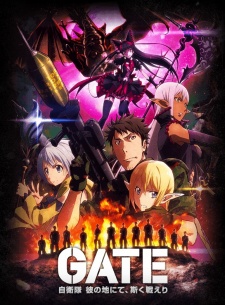
Maybe it isn’t my place to say this about the Fire Dragon Arc, which features a showdown with a supposedly impenetrable fire dragon, an Imperial coup d’etat, and burgeoning peace talks between Japan and their new otherworldly neighbors the Empire, but I get the nagging suspicion that barely anything truly changed in the world of Gate with this installment. If one were to take Japan from the beginning of the first season of Gate and compare it to the ending, there is surely a marked change in their attitudes, their political connections, and their accepting of the new paradigm the Gate and the Empire bring. If it unfair to hold the second season to the same standard of change, then it is still my right to say that the process of barely anything happening was noticeable and dampened the enjoyment of the meandering Fire Dragon Arc .
The change from the first season seems to mostly be on character focus. Where the first season stroked the ego of the unassuming but perfect soldier-otaku Itami, as well as the hypersexualized death machine Rory, the second season brings more focus to the political entities of the Empire and the JSDF through diffusing focus between different individuals on both sides, and brings some character depth to Lelei and Tuka, the latter of whom was a complete non-factor in the original Gate. This change is very welcome, as it begins to break down the political monoliths at war across dimensions and instead diversifies the way in which politics and negotiations function morally by attaching them to specific people. Likewise, Tuka may be unfulfilling as a character and is ultimately used to fetishize trauma and parental issues, but she brings a hell of a lot more to the table than the tiny girl sex machine with an axe known as Rory, while Lelei as a competent entity beats out Itami in enjoyment by a mile, striking the balance between self-assured and humble where Itami took both to annoying extremes.
Unfortunately, just as the Fire Dragon Arc tips its hat at more complex politics and walking the fine line of war and peace, it crumples that up and throws it directly in the trash, as the various powers in Japan buckle to pure unabashed morality for the sake of saving one or two people, only to have their choice validated without too much loss on their side, neither death toll nor political capital. The Empire is run by the hotheaded Prince Zolzal and his scheming cohort Tyuule, and what this boils down to is that the true core of the Empire is hell-bent on war, meaning that the more nuanced peace talks are held with lower-ranking nobles, accomplishing little other than propping up the moral rightness of Japan whilst letting them get away with full-on invasion. It is excused away by the simple fact that the top of the Empire hungers for war at any cost.
The fire dragon too is a distraction, despite being the titular conflict of the Fire Dragon Arc . The two elves of last season Tuka and Ducy both have deep-seated issues revolving around the fire dragon, and in some ways Ducy’s warrants merit, as the dragon to her poses the threat of annihilation for her clan. Of course we only meet the clan just prior to fighting the dragon, and so we once again have no emotional investment in this altruistic act above the fact that it is inherently altruistic. It also allows Tuka to snap out of her empty shell that we have seen her with since the moment she first appeared, which gives her absolutely no new character depth and rather serves to fully add her to the Itami harem in a slightly disturbing fashion. Around the time she starts calling Itami “daddy”, I felt a mix of pity for her emotional trauma and extreme pity for the function she is clearly meant to play in the show.
So if the dragon serves only to push a moral agenda and turn a couple of characters from sad to happy, and the peace talks complexify the very notion of war that ultimately dominates the screen unchanged from before, what’s left? The peaceful factions in the Empire are allowed to formally change their allegiance to Japan, but this simply puts in writing what has been immutable the whole time. One subplot mentioned only in passing during the first season about Rory’s love life comes back to take center stage for all of five minutes before disappearing and never showing up again, left completely unresolved. Lelei furthers her ambitions as a genius magician by attempting to become a certified magic master, but this is halted because they can’t appoint her a master until random assassins stop trying to kill her, which they solve by walking into Prince Zolzal’s throne room with a pistol and ask him to stop trying to kill her. We still don’t see her become a master, of course. In the end this gives us a relatively unchanged Itami, Rory, Lelei, Empire, and Japan, with a bit more screentime to the side characters and two happy elves. Not quite progress.